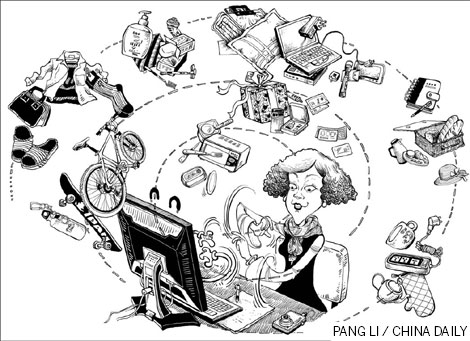Life and Leisure
What goes around, comes around
By Xu Junqian (China Daily)
Updated: 2010-11-18 07:49
 |
Large Medium Small |

Of the rash of bartering sites that appeared in 2006, only a few survive. But their patrons believe money-less exchange is the way forward for a green lifestyle. Xu Junqian reports
Shanghai native Li Huizhu, 48, claims not to
be inspired by the much-told tale of Canadian blogger Kyle MacDonald, who bartered his way from a single red paper clip to a house, through a series of online trades, in 2006.
The home manager has swapped coupons and show tickets given by the nursery school where she teaches, and cosmetics gifted by friends and colleagues, for more than 500 items of everyday use.
This has helped her accumulate all the shampoo and soaps her family has needed over the two years that she has been bartering.
And when her son got ready to leave home for college in September, Li got everything he wanted for his dormitory and classroom -from pillows to battery chargers, from pens to notebooks, and secondhand bicycle to trolley - through barter.
"Bartering helps both parties by making possible the exchange of items of comparable value and use," Li says.
"Everything, except for money, is exchangeable on the bartering website. All you do is upload a picture of the items you don't want, write a few words about it, leave your contact information and then, just wait and see what happens," says Li, who could not even chat online two years ago, but is now a photoshop ace, and a top seller of the website's 20,000 registered members.
"The only rule to follow is to be honest with what you deal. Don't brag about or hide anything. And keep in mind the item's utility for the other side," Li adds.
But Sun Yumin, one of the founders of www.shhkw.cn, the Shanghai-based bartering website, and Li's friend, believes successful bartering calls for "a special talent" - a combination of a salesman's persuasiveness and a collector's shrewdness.
"Bartering is based on trust. There is never a guarantee of satisfaction. And conflicts occur frequently, especially when it comes to electronic gadgets," Sun says.
To minimize troubles, the swapping of goods is usually done face-to-face, so that the items can be examined personally before a deal is sealed.
These meetings invariably happen at subway stations along a line that goes through either or both participants' workplace.
"Since the core idea in bartering is to spend less, we need to keep costs to a bare minimum," Sun says.
These personal meetings also lead to unlikely friendships.
"Girls and boys my son's age come to me for help with telling fakes from originals, and secondhand from new. I feel young and happy hanging out with them," Li says.
According to Sun, 70 percent of the website's members are young white-collar workers, with retired or middle-aged computer literate people comprising the rest.
There are currently about 150,000 barter items listed on the website. But the overall volume of transactions is hard to estimate as most of the deals are made offline.
The most popular items are discount shopping cards, bakery coupons and show tickets that have a precise value.
A site attached to a Web design and development company in Jinan, Shandong province, www.shhkw.cn, was one of the hundreds of bartering websites that cropped up in 2007, when the legend of Kyle MacDonald swept through the country.
But most were unable to turn in a profit and shut down. Since it provides a free service to those using it, shhkw.cn makes money only through advertisements posted by other online stores, and that is often just enough to offset its basic costs.
Apart from some technical support from its parent site in Jinan, Sun manages the site on his own, while keeping his regular job as a science teacher in a junior school.
The only reason for its survival, Sun says, is that it is free. That leaves little scope for any expansion, in spite of its increasing popularity.
Gu Zhong, an IT engineer who also set up a bartering website (eeebbb.cn) two years ago, agrees.
They are now looking for ways to promote bartering as essential to a green lifestyle and hope they can work with environment groups to promote the idea.